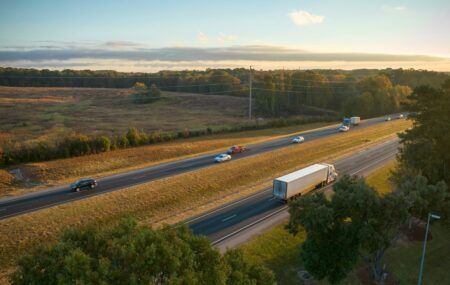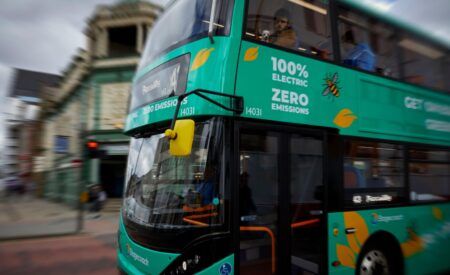As part of its long-term plans to improve air quality across the country, the UK government has announced that from February next year (2019), trucks meeting the latest Euro VI emissions standards will be eligible for a 10% reduction in the cost of the heavy goods vehicle (HGV) levy.
The HGV Road User Levy, which was introduced in 2014 and applies to all heavy goods vehicles weighing 12 metric tons or more, was brought in as a first step to ensure trucks pay a charge to cover the greater wear and tear they cause to road surfaces than other vehicles. The cleanest trucks generate 80% less nitrogen emissions than dirtier ones, so those vehicles that do not meet the latest European emissions standards will be expected to pay 20% more. The government hopes that this change to the levy will further incentivize the freight haulage industry to choose less polluting trucks.
The current HGV levy rate is £1,000 (US$1,407) per annum, with the new rate for Euro VI-compliant vehicles reducing to £900 (US$1,266) in February 2019, while those not meeting the standard having to pay an increased fee of £1,200 (US$1,687). When the change comes into effect, more than half of UK vehicles will pay less. As increasing numbers of companies move to cleaner vehicles, the UK haulage industry overall will pay less.
The HGV levy is just one element of the government’s £3.5bn (US$4.9bn) program to clean up the country’s air and reduce emissions, which includes £255m (US$358.7m) for councils to improve air quality, and a dedicated Clean Air Fund of £220m (US$309.4m) for those local areas with the biggest air quality challenges.
Announcing the changes to the truck levy, UK Roads Minister, Jesse Norman, said, “This government is committed to improving the air we breathe and delivering a green revolution in transportation. Heavy goods vehicles account for around one-fifth of harmful nitrogen oxide emissions from road transportation, but they only travel 5% of the total miles. That’s why we’re changing the HGV levy to encourage firms to phase out the most polluting lorries and bring in the cleanest ones.”
UK Environment Minister, Thérèse Coffey, commented, “Air pollution has improved significantly since 2010, but we recognize there is more to do which is why we have put in place a £3.5 billion plan to improve air quality and reduce harmful emissions. Poor air quality affects public health, the economy and the environment, and all motorists, including hauliers, must play their part if we are to clean up our air for the next generation.”




